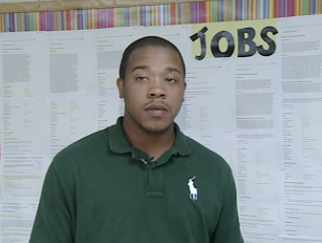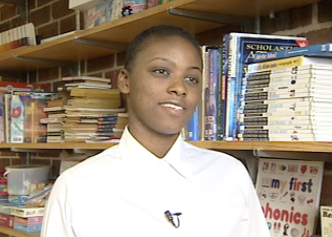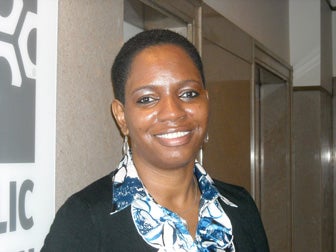Teaching skills to curb teen pregnancy
Federal money is now backing a new approach to teen pregnancy prevention. Supporters say abstinence-only programs have failed. And on the flip side — simply boosting kids’ knowledge of sexual health and contraception is not working either. Sites in Wilmington and Philadelphia are testing two approaches.
The Carrera program founded in New York will be duplicated at Wilmington’s West End Neighborhood House. [Sexual education topics are discussed]
Federal money is now backing a new approach to teen pregnancy prevention. Supporters say abstinence-only programs have failed. And on the flip side — simply boosting kids’ knowledge of sexual health and contraception is not working either. Sites in Wilmington and Philadelphia are testing two approaches.
It’s a little scary what teens know, and don’t know, about avoiding an unwanted pregnancy.
Stefine Brown became a dad at 15. When he first started having sex, he used condoms for a little while.
“I thought I wouldn’t get nobody pregnant. I was like, ‘I’m too young, it’s not going to happen. You have to be a little bit older, mature in the body. That’s what I thought, and it was a lie, I thought wrong,” Brown said.
His daughter’s birth ended Brown’s involvement in the youth sports he loved. But it didn’t change his sexual habits much. He had a second child at 16.
Brown lives in Wilmington, where more than one-third of the births to teens are young people from the city’s West Side. Caprice Holmes had her first daughter at 19.
“I knew about birth control, I knew about condoms, I knew about the shot, too. I knew pretty much how to protect myself, I just choose not to,” Holmes said.
Holmes dropped out of high school and was pregnant two years later. By that time, her dad was in jail; and her mom was not around much.

“I never really had anybody come to me to really say anything, so it was like whatever, ‘Screw it, just let me do whatever I’m going to do,’” Holmes said.
A program founded in New York has one of the best track records in the nation for preventing teen pregnancy. Founder Michael Carrera says: talk all you want about condoms and safer sex. But he says, those messages do not stick unless you help young people with the other issues in their lives.
“When young people feel good about their future they reduce risks on their own,” Carrera said.
Carrera’s program offers a comprehensive approach to teen pregnancy prevention — homework help, money management and other so-called “above the waist” skills. Carrera says confidence, job readiness and better relationships with adults have a “contraceptive effect.”
“Meaning if they do decide to have sexual contact, despite what we urge them to do, then they are more likely to use a contraceptive than not,” he said.
A Wilmington community center will replicate the Carrera model with adolescents from the West Side. In Philadelphia, Tammi Fleming is leading a different “above the waist” prevention program.
 “We need to say, ‘I expect you to finish school.’ We need to say, ‘I would love for you to remain abstinent until you are married.’ We need to say that to our children,” Fleming said.
“We need to say, ‘I expect you to finish school.’ We need to say, ‘I would love for you to remain abstinent until you are married.’ We need to say that to our children,” Fleming said.
Fleming says parents are best suited to have those discussions but often they are not equipped with accurate information.
In the Plain Talk program, one neighbor invites other parents and grandparents to join a series of kitchen-table discussions. It is like a Tupperware party where the parents of teens get schooled on the facts of life. They also learn how and when to talk to their kids.
“Because you can’t say it in the middle of an argument as the child storms out of the room,” Fleming said.
Parents in the program become “askable adults” a community resource, of sorts — someone to turn to when teens have questions about avoiding pregnancy and sexually transmitted infections.
Plain Talk will host home health parties in the Fairhill and Norris Apartments, two housing developments in Northeast Philadelphia. From 2003 to 2006, the average birth rate for adolescent girls in two nearby ZIP codes was 40 percent higher than the citywide average.
 Before the program begins, Plain Talk will conduct a neighborhood survey to figure out the best curriculum for those kitchen-table discussions.
Before the program begins, Plain Talk will conduct a neighborhood survey to figure out the best curriculum for those kitchen-table discussions.
“A lot of residents don’t connect with the statistics from the state level, this is a way to say here’s what’s going on right here in our small area,” Fleming said.
In surveys from other cities one finding is always the same. “Parents adamantly believe at the baseline that they are speaking to their young people about these topics. Young people adamantly say ‘no’ it’s not happening,” Fleming said.
The Wilmington and Philadelphia programs are getting federal support. The money was freed up when the Obama administration slashed funding for abstinence-only education. Supporters say that policy change reflects what works to prevent unwanted pregnancies — not what is politically popular.
WHYY is your source for fact-based, in-depth journalism and information. As a nonprofit organization, we rely on financial support from readers like you. Please give today.

